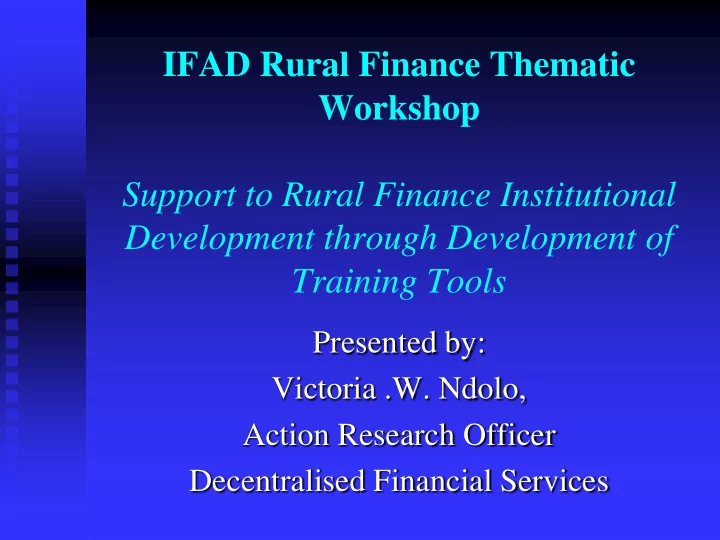

IFAD Rural Finance Thematic Workshop Support to Rural Finance Institutional Development through Development of Training Tools Presented by: Victoria .W. Ndolo, Action Research Officer Decentralised Financial Services
Decentralised Financial Services Reaching remoter areas of Kenya with financial services: An action research project
Background Initiative under MicroSave – Africa addressing the problem of rural outreach Pilot phase: Develop and test simple and effective tools and delivery techniques to strengthen operations, management and governance in community based financial organisations as a building block for developing sustainable and robust decentralised financial systems in Kenya
What DFS has done so far Reviewing the financial landscape in Kenya to see which types of models reach into remoter/rural areas and serve poorer people. Determined that there are limits to where MFIs can sustainably provide services Identified those limits by type of institution One step beyond-Challenges and opportunities in promoting quality financial services in remoter areas One step beyond- Tackling the ‘frontier’ of microfinance provision in Kenya
Frontier’s of Microfinance in Kenya Population 400+ 400-301 300-201 200-101 < 100 density Poverty Incidence Geographical frontier 81%-100% Poverty frontier 61%-80% WEDCO WEDCO WEDCO 41%-60% WEDCO WEDCO FSAs WEDI FSAs FSAs FSAs FSAs 21%-40% WEDI WEDI WEDI WEDI WEDI Equity Equity Nyeri SACCO Nyeri Nyeri SACCO SACCO FSAs FSAs 0%-20%
What DFS has done so far Concluded that community based financial organisations (managed ASCAs, FSAs and some SACCOs) were most effective at pushing the frontier Identified need for tools to enhance group formation and development Developed tools and tested the tools with ARPs
Challenges faced by CBFOs Challenge of sustainability Poor management and governance Low levels of education/literacy Power dynamics in the community Low levels of transparency and accountability Poor infrastructure Principal- agent problems
Development of simple tools Worked with ARPs to address the challenges: strengthen governance and management through tools: • Governance: Board and member education • Management: bookkeeping; internal controls; audit; management information systems; savings and credit methodology; portfolio and default management; legal issues for default and recovery Action research: design tools; test; get feedback; revise; test again…
List of tools Group well being Group Monitoring tool Strengthening Groups tool Responsibilities and qualities of office bearers and members tool How to elect good group leaders tool Types of group records tool Rules for giving loans to members tool Portfolio and default management tool
List of tools Group Accounting tool for ASCA groups Group Accounting tool for groups Guidelines for making a constitution/bylaws/ rules for the group tool Tool for reviewing group records Group financial performance indicators tool Oversight tools: Group internal, group external,supervisor’s Conflict analysis and resolution tool
What DFS has done so far Identification and selection of groups Used Group Well Being and Group Monitoring tool to collect baseline data of the group Tested tools with the test groups Used progress forms to collect primary data from testing and control groups
IMPACT Improved loan repayments and collection Improved attendance of meetings Better savings by members Better repayment by members Improved record keeping systems Groups are able to assess their performance Better understanding of roles and responsibilities Elections and change of group office bearers
Challenges Tools cannot work in a vacuum Lack of adequate time to train groups Perceptions of the group by trainers Use of English language in the tools Getting timely feedback Lack of strategic and systematic implementation of microfinance activities
Challenges Conducive environment for training Lack of affordable training materials in the rural areas Capacity weakness among ARPs Different levels of understanding and literacy levels among the members in the groups No structured training programs for groups
How the challenges are being addressed Integrating tools into the methodologies Develop training programs with ARPs Translation of tools The groups were eager to learn though some were illiterate Supervision of data collection Use process mapping to improve methodologies
How the challenges are being addressed Develop a training program for training of trainers and field officers manuals Training of trainers-include adult learning techniques Participatory development of the tools Participatory learning ARPs eagerness to learn from each other The use of visual aids , exercises and stories created an interest and simplified learning process Creativity and innovation of lessons learnt by groups
DFS-Phase II Development of training modules for trainers and field officers Process mapping of methodologies using MicroSave Process Mapping Tool Integrating the tools into the different methodologies Developing a facilitator/trainer profile Develop tools for SACCOs /MFIs
Questions?
CONTACTS Decentralised Financial Services 4th Floor, Shelter Afrique House, Mamlaka Road, P.O. Box 76436,00508 Yaya, Nairobi, Kenya Tel: 254 (020) 2724801/2724806/2726397 Fax: 254 (020)2721454 Email: dfs@ MicroSave .org Website: www. MicroS a ve .org/df s
Recommend
More recommend